Gateway to Scotland is roadside 'dumping ground'
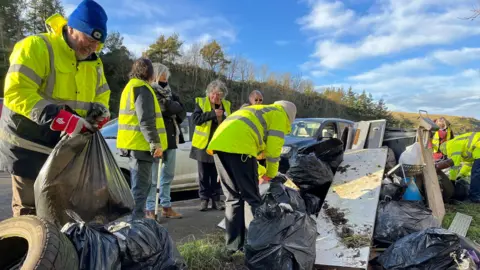 BBC
BBCA plea for help has been issued by litter-picking groups along one of the busiest roads in and out of Scotland.
Dozens of bags of rubbish are collected each week from lay-bys and verges along the A1 'gateway to Scotland' between Edinburgh and the border with England.
Volunteers are regularly faced with bottles of pee, bags of poo and a growing amount of household items as they fight to keep the roadside clean - and they believe the time has come for more support from central and local government.
Alison Currie from Berwickshire Anti-Litter Group said: "At the moment the A1 is nothing more than a dumping ground."
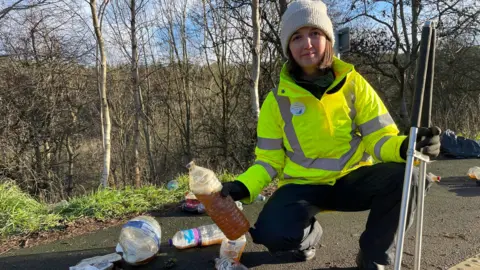
Around half-a-dozen different voluntary groups collect litter along the 50 mile (80km) stretch of A1 between Edinburgh and the border with England.
Catherine Cunnane organises litter picks in four lay-bys on the A1 near to her home in the village of Grantshouse.
She admits the cleaning-up process is far from pleasant.
"There are nearly always a few large plastic bottles filled with urine - and we also get bags of excrement from time to time as well," Catherine revealed.
"We normally do our litter picks on a Thursday morning and by the afternoon there's fresh litter in the very spots we just cleared.
"We're trying our best to make this area better, but it's a constant struggle."
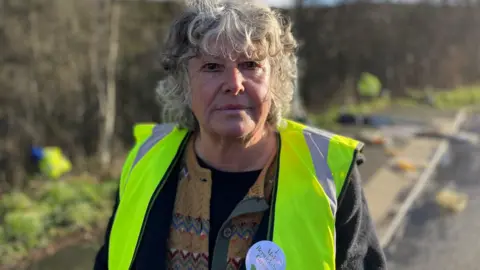
Volunteers from the various litter-picking groups along the A1 believe they face a three-pronged problem with discarded rubbish from vehicles, fly-tipping in lay-bys, and unsecured waste being blown from commercial lorries on their way to the nearby landfill sites and recycling depots.
Last year the Berwickshire Against Litter group - or the Auld Baggers - collected 5,000kgs of litter from roadside verges and lay-bys.
Alison Currie from the group said: "As well as picking up the litter, we are now going into schools to educate children on the problem of litter, and lobbying our politicians about the mess.
"What's the point of anti-littering and fly-tipping legislation if there is no enforcement?
"We need public education campaigns, better enforcement and some joint up thinking to tackle the A1's litter.
"At the moment it's just a dumping ground."
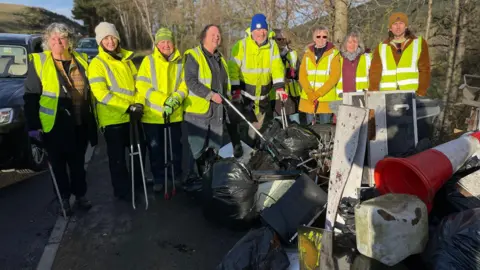
Both Transport Scotland and contractors BEAR Scotland say that they are aware of the litter problem along the A1.
While the local authority is responsible for single-carriageway sections, their own litter-picking teams collect an average of 600 bags each month along trunk roads in the south east of Scotland.
BEAR manager Tommy Deans said: "Transport Scotland and BEAR Scotland continues to encourage collective efforts to tackle litter and ensure Scotland's trunk roads are maintained to a high standard."
"We have been working closely for a long time now with the local community groups to address litter issues along the A1.
"We welcome community efforts and acknowledge their valuable work to bring attention to this problem, which unfortunately is seen too often across the country."
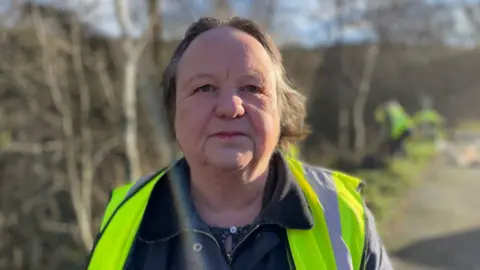
While the problem of fly-tipping and littering through Berwickshire is increasing, Jacquie Bell from Dunbar Against Litter believes the problem escalates further when you get closer to the capital.
She said: "It's a major problem all the way along the A1, but once you go north of Dunbar it gets even worse - the verges are thick with rubbish.
"As well as the problems we have further south, there're more building sites with plastic blowing towards the road, and more vehicles going to the landfill site with rubbish being blown out.
"Dunbar Against Litter do their best but much of the A1 in that area in dual-carriageway, and we're not allowed to litter pick on dual-carriageways."
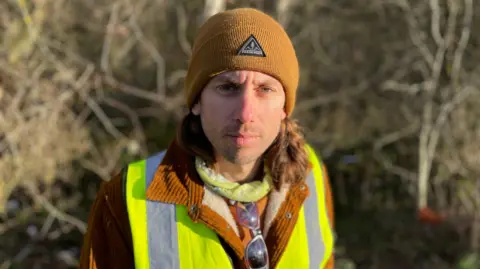
Luke Bennet from Dunbar Against Litter added: "We urge drivers to stop using the A1 as a dumping ground.
"It affects the environment and the wildlife, as well as humans who live along this road."
Police Scotland say they work closely with local partners to address the issue of discarded litter.
Inspector Ross Drummond said: Not only is it unsightly for local areas, but it is also an offence.
"Anyone with any concerns should contact their local authority or Police Scotland on 101."
